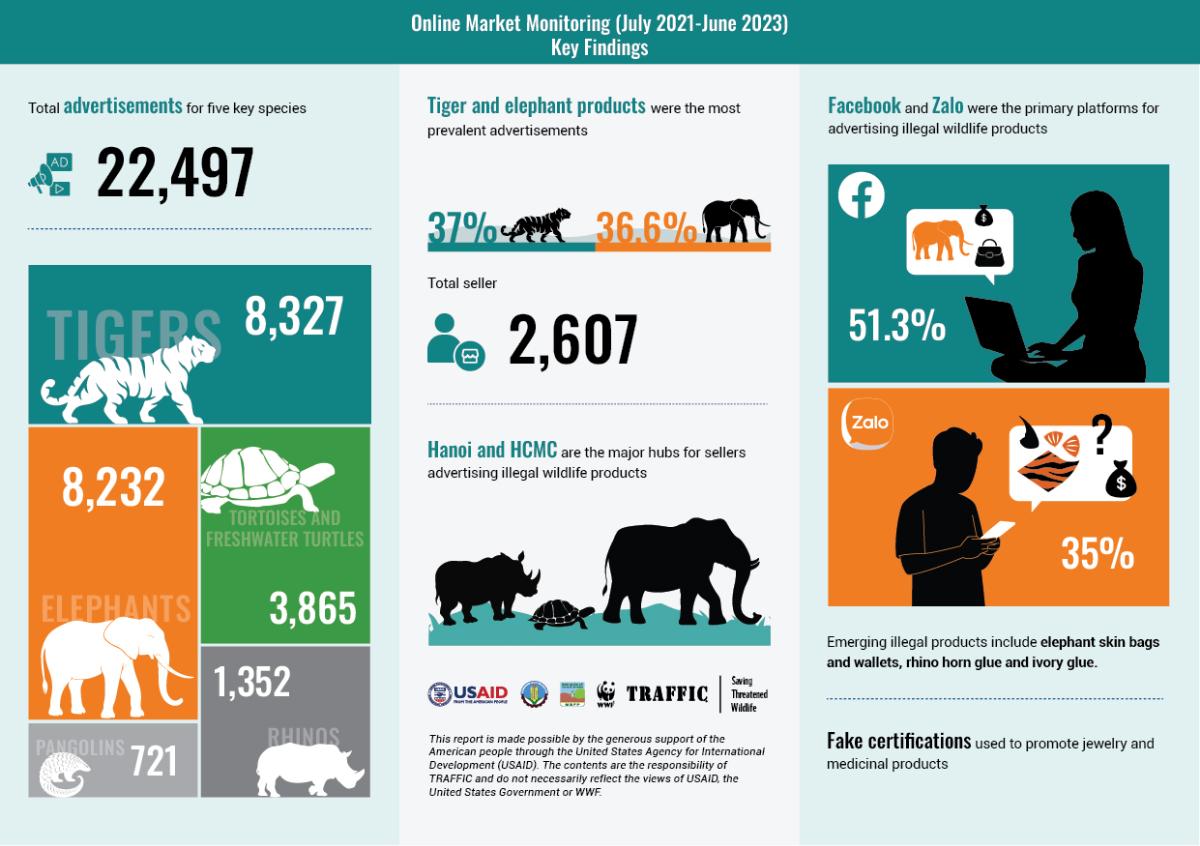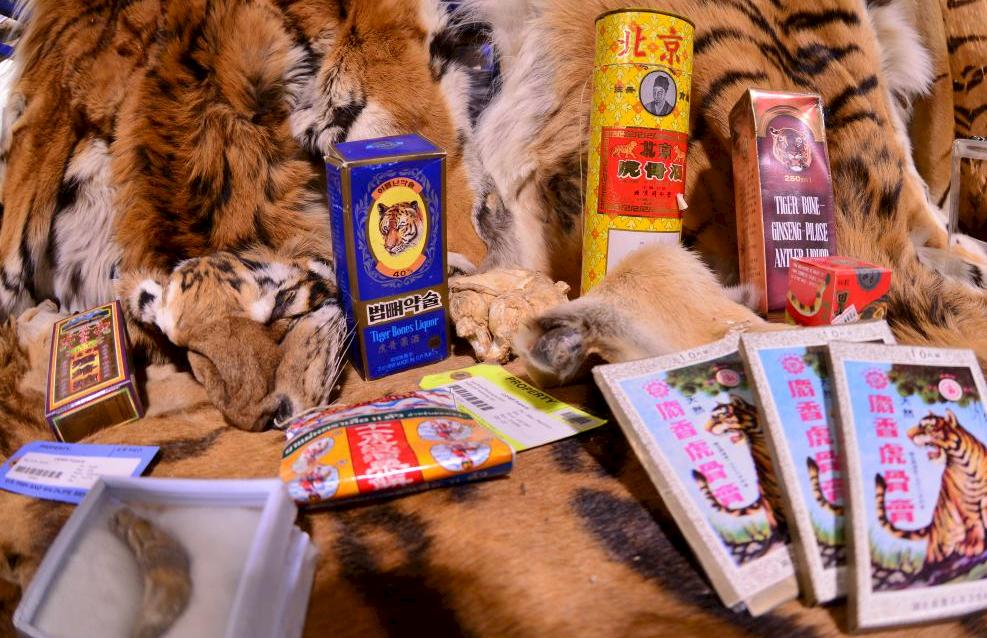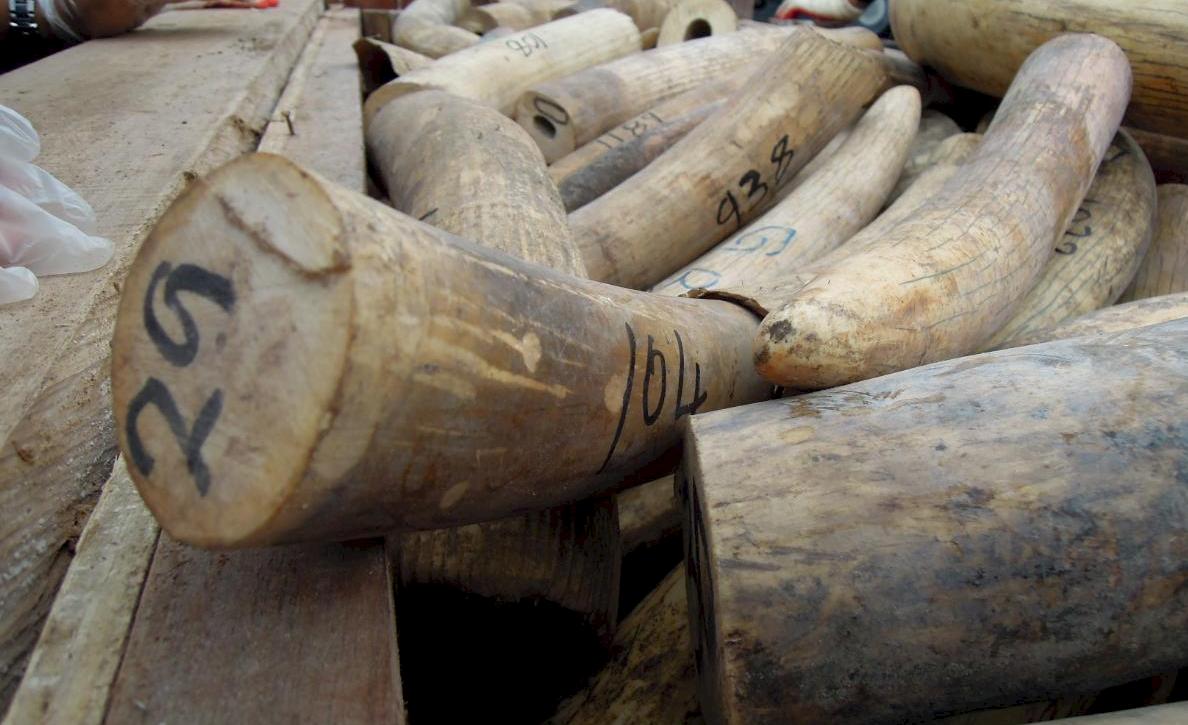New research shows alarming levels of online illegal wildlife trade in Vietnam
USAID-supported research reveals the abundance of online illegal wildlife trade in Vietnam.
HANOI, December 4, 2024 – The trade of elephants, rhinos, pangolins, and tigers and their products is prohibited or restricted under Vietnamese law. Wildlife trade online is also regulated by the Electronic Transaction Law No.51/2005/QH11 and Decree 52/2013/ND-CP for e-commerce, making it illegal to advertise and trade wildlife products such as ivory and rhino horn online. However, a new research report developed by TRAFFIC, with support from the U.S. Agency for International Development’s (USAID) Saving Threatened Wildlife project, has uncovered an alarming breadth of online adverts offering illegal wildlife products for sale in Vietnam.
The research, conducted between June 2021 and July 2023, reveals the widespread availability of products from endangered species, including elephants, tigers, pangolins, rhinos, tortoises, and freshwater turtles, across major e-commerce and social media platforms.

Ms Trinh Nguyen, Traffic's Vietnam Program Office Director, said:
“The landscape of illegal wildlife trade in Viet Nam is constantly evolving, making it harder to track and control. Through regular monitoring of market dynamics, and with the support of the Saving Threatened Wildlife project, TRAFFIC documents how wildlife traders operate and adapt across these spaces. This ongoing surveillance helps authorities and conservationists understand current market trends and trading patterns of protected species.”

Key research findings include:
- The identification of 22,497 online advertisements for illegal wildlife products (equivalent to 30 posts/day).
- The dominance of Facebook (51.3%) and Zalo (35%) as primary platforms for this illegal trade.
- Hanoi and Ho Chi Minh City, both established major hubs, are offering products from all five surveyed species.
- Tiger products, elephant ivory, rhino and pangolin products are among the highest number of posts highlighting the continued demand in Vietnam and threat to endangered species globally.
- Advertisements for tortoises and freshwater turtles also include the illegal sale of critically endangered and protected species native to Vietnam.
- New trends with the promotion of wildlife "glues" - products claiming to contain mixtures of multiple endangered species like tiger, elephants, pangolins, complicating law enforcement efforts.
The report highlights that these products are advertised for various purposes, from ornamental to ceremonial (religious), medicinal and pet trade. In some cases, unverified Certificates are attached to the advertisements to prove the authenticity of ivory jewellery or traditional medicinal products containing pangolin scales.

Mr. Do Quang Tung, Director of the Central Project Management Unit (CPMU), added:
“The continuous efforts to monitor online wildlife crime trends revealed useful insights demonstrating the urgent need for a coordinated government response. We urge the enforcement agencies to act on these findings by strengthening their interventions and updating their strategies to address current trafficking trends.”
To combat this growing illegal market, the report recommends multiple-sector actions:
- Social media and e-commerce companies should enhance their monitoring capabilities, train staff, and implement stricter policies against posts enabling illegal wildlife trade.
- Law enforcement agencies should intensify their investigative efforts and forge stronger partnerships with online platform companies to investigate repeat posters.
- Traditional medicine sector to investigate ‘authentication’ certificates and work with the Traditional Medicine sector to remove protected species from medicinal practices.
- NGOs should collaborate with online companies and government agencies to increase awareness and understanding of wildlife protection laws.
Ms Michelle Owen, Chief of Party for the Saving Threatened Wildlife project, concluded:
“Increased online access and growth in e-commerce opportunities are important for Vietnam’s development. However, ensuring the content of online markets is compliant with the law needs coordination across the public and private sector and greater awareness of consumers to make informed decisions so they do not buy illegal wildlife products.”
About USAID

The United States Agency for International Development (USAID) is responsible for the majority of overseas development assistance from the United States Government and works to end extreme poverty and promote resilient, democratic societies while advancing security and prosperity for America and the world. www.usaid.gov/
About WWF
WWF is an independent conservation organisation, with over 30 million supporters and a global network active in over 100 countries. WWF's mission is to stop the degradation of the Earth's natural environment and to build a future in which humans live in harmony with nature, by conserving the world's biological diversity, ensuring that the use of renewable natural resources is sustainable, and promoting the reduction of pollution and wasteful consumption. For latest news and media resources, see panda.org/news
About VN Management Board for Forestry Project
The Management Board for Forestry Projects (MBFP) is a public non-business unit under the Ministry of Agriculture and Rural Development (MARD). As the owner of ODA/concessional loan-funded programs/projects, MBFP directly manages or jointly implements these programs/projects in forestry and rural development nationwide.
MBFP Website



